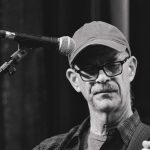

By: Gail Obenreder
“American folk music and songwriting has space for original, meaningful work – so it just seems natural to me to write these songs.”
Mike Miller once heard the great Arlo Guthrie say that he “didn’t feel he wrote songs so much as catch them as they came by in the stream of consciousness, like fishing.” Miller shares this view of songwriting. “There are yet some good songs to find, and occasionally some get to the point in the stream where I am, and I get to land one.”
Accompanied mostly by his guitar, Miller has been landing them all his life, first as a teenager with few resources and then throughout his long-term careers in arts administration and the mental health field. Originally from Washington DC, he was the youngest of five children. “It would be generous to say our situation was challenging.” The self-taught musician bought a guitar at age 16 “with money from my first job,” and he’s come to his current artistic practice through “great persistence and patience.”
“Old Russian Mother,” 2022, Michael Miller
Early on, there was little time or space for musical continuity; he was focused on survival. Yet Miller found that “when I could access it, music was always a consistent support.” He was first inspired at age 7 by Pete Townsend, whose music led him to feel “the full experience music can create” and planted his passion to make music and write meaningful songs.
Living in many places and communities, amid a variety of musical influences, shows in Miller’s work. He’s come to admire the iconic Willie Nelson for showing “what is possible through honest music and authentic living.” He also cites Neil Young for his ability to be “subtle while being overt, plain while also penetrating,” an apt description of this Established Fellow’s own “authentic and meaningful songwriting.”
Miller earned a Masters Degree in American Civilization at George Washington University, and much of his career was centered in the field of traditional culture. He came to Delaware in 1996 as the state’s folklorist, staying for a decade to complete the Folk Art Collection and open the Blue Ball Barn. He then became a mental health counselor, and both these professions gave him divergent but important insights as he sought to fill his songs with “powerful lyrics and relatable tunes.”
The Felton resident has “learned to let it flow when it does so naturally and to not push it if not.” These days, he’s particularly inspired by people and musicians closer to home, “at gatherings I get to – jazz jams, blues jams, folkie – and my songwriting friends.” And when not with his guitar, Miller can be found camping and day hiking, anchored by being in nature. But his wide interests also include a fascination with “the cultural landscape – how we create and use space and all the architecture and forms that go along with it.”
The pandemic had little direct impact on Miller’s songwriting, though it enabled him to create a much-praised online performance at Dover’s Old State House as the pilot for their “Stay at Home Concerts” series. And he’s noticed an appreciation for what we missed during that time. “Folks seem able to enjoy themselves socially a bit more easily these days.”
The Division’s Fellowship is “about as good as it gets . . . a deep validation of all I really care about and believe in.” He plans to upgrade equipment to improve his performances and secure professional recording time. And he’ll continue to focus on the three things his music is always leading him to do – “creating community, signifying our shared cultural experience, and contributing to our cultural fabric.”
Fellowship Home